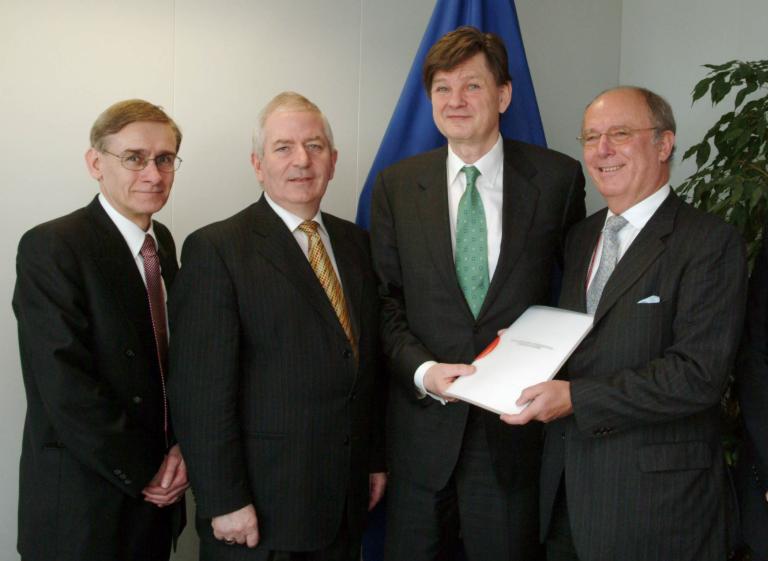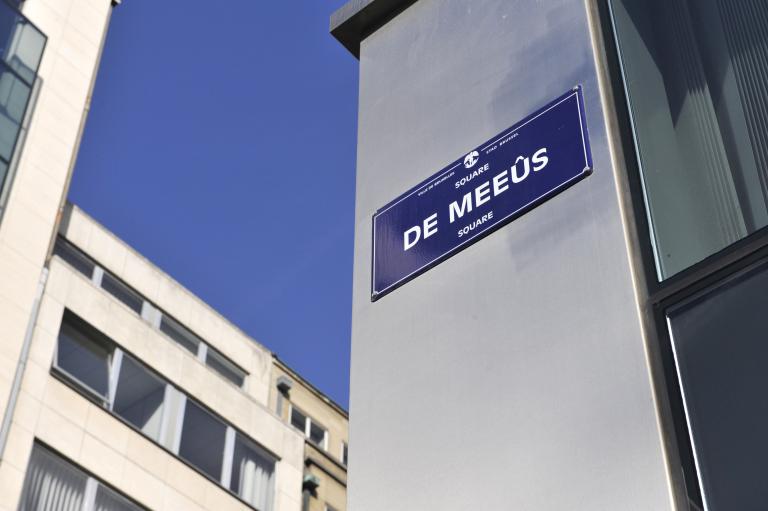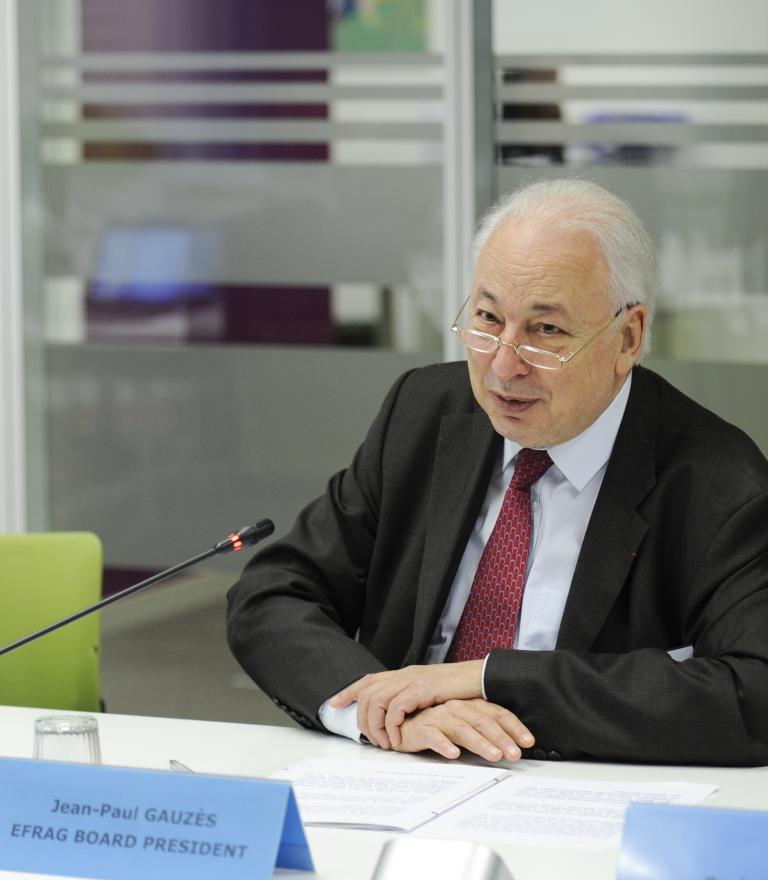Elements of history and reforms
EFRAG was established in its current legal form in 2001, following a request of the European Commission to the private sector, to provide input into the development of IFRS Accounting Standards and to provide the European Commission with endorsement advice, technical expertise and advice on accounting matters. Key milestones in the history of EFRAG are described below.
Establishment of EFRAG
EFRAG membership is composed of 10 European Stakeholder organisations called "the Founding Fathers". (FEE (now Accountancy Europe), EFAA, UNICE (now BusinessEurope), ERT, EBF, EACB, ESBG, CEA (now Insurance Europe), EFFAS and FESE. ERT and FESE left the EFRAG membership in subsequent years.
The structure was composed of the EFRAG Supervisory Board (chaired by Göran Tidström, FEE (now Accountancy Europe), Sweden) responsible for governance and oversight of the organisation and of the EFRAG Technical Expert Group that was in charge of making decisions in all core activities of EFRAG. The EFRAG Supervisory Board members were representatives of EFRAG Member Organisations.
EFRAG TEG was composed of 11 independent members. The EFRAG TEG Chairman (Johan van Helleman, Academic, the Netherlands) was a part-timer free of charge. The executive responsibility rested with a Secretary General (Paul Rutteman). The EFRAG Consultation Forum of Standard Setters (EFRAG CFSS) was established at the outset also. No meeting was held in public at the time. On endorsement, EFRAG TEG could recommend endorsement if a simple majority in the group was in favour; EFRAG TEG could recommend to reject an IFRS only if a qualified majority of 2/3 supported the decision. The IASB and CESR (now ESMA) were observers in EFRAG TEG.
Main achievements:
-
Assessing the compatibility of all existing IAS standards with the Accounting Directives
-
Providing endorsement advice "en bloc", except for IAS 39 Financial Instruments
-
Setting up EFRAG's due process (issuance of draft comment letters for public consultation)

First enhancement of EFRAG
A few changes are made in the governance: the Chairs of the National Standard Setters from France, Germany and the UK became non-voting members of EFRAG TEG. The EFRAG TEG Chairmanship becames a full time position, combined with the EFRAG CEO responsibility, however remains free of charge to EFRAG (Stig Enevoldsen). EFRAG TEG meets in public.
Main achievements:
-
Building up EFRAG's technical credibility and visibility; creation of the Advisory Fora;
-
All IFRS and amendments of IAS issued so as to support first-adoption of IFRS in the EU in 2005 are considered for endorsement advice;
-
Signing the "Flandres Agreement" with the National Standard Setters of France, Germany and the UK to undertake the PAAinE activities (Pro-Active Activities in Europe). First joint Research projects are carried out with National Standard Setters in Europe;
-
Acknowledged at international level as a key stakeholder in the IFRS financial reporting arena;
-
Acknowledged as the official technical advisor of the European Commission in the Working Arrangement signed in 2006; EFRAG is entrusted with the responsibility for assessing IFRS for endorsement from a financial reporting perspective only;
-
Creation of the first National Funding Mechanisms (i.e. voluntary cash contributions to EFRAG collected at national level).
-
March 2006 signing of the Working Arrangements with the European Commission.

EFRAG "Plus" reform
The EFRAG "Plus" governance reform was designed so as to make EFRAG qualify for EU public funding by the European Commission. The EFRAG Supervisory Board Members are appointed as independent members and include four "Public policy" members nominated by the European Commission, one of which was appointed as the EFRAG Supervisory Board Chair (Pedro Solbes up to November 2012, Hans van Damme, Acting Chair thereafter). Partnership in Research Activities was officialised with the creation of the EFRAG Planning and Resource Committee (PRC) (composed in equal numbers of EFRAG Supervisory members and representatives of National Standard Setters in Europe and of the EFRAG TEG Chair). The EFRAG PRC took responsibility for making all agenda and resource allocation decisions for EFRAG ProActive (research) Activities. Majority rules were changed in EFRAG TEG, so that endorsement decisions are made, whether positive and negative, on the basis of simple majority. In April 2010, Stig Enevoldsen handed over the responsibility of EFRAG Chair and CEO to Françoise Flores. The Italian Standard Setter was appointed as non-voting member in EFRAG TEG. in addition to the German, French and UK Standard setters. First EU funding is granted from 2010 onwards.
Main achievements:
-
Significant Research activity undertaken, after first EFRAG agenda consultation;
-
Providing strong European input in all projects included in the IASB-FASB convergence program, from first exposure-draft stage until completion or suspension;
-
Development of EFRAG's due process with outreach initiatives, field work policy and feedback statements;
-
Launching of EFRAG's permanent outreach to users;
-
Establishing permanent communication with the IASB so as to provide European views throughout the standard-setting process, including after a comment letter has been submitted;
-
Becoming an active member of, and contributor to, the IASB Accounting Standard Advisory Forum;
-
Active contributor to Philippe Maystadt consultation on how to best enhance the influence of Europe in the development of IFRS;
-
Implementation of EFRAG "Maystadt" Reform with the reform becoming effective on 31st October 2014.

Maystadt reform
Philippe Maystadt was appointed by EU Commissioner Barnier as a special advisor on 19 March 2013 to set out recommendations to “reinforce the EU's contribution to International Financial Reporting Standards (IFRS), and to improve the governance of the institutions developing these standards.” In his final report presented in November 2013, Philippe Maystadt recommended transforming EFRAG with a view to strengthening the EU’s influence in international accounting standard-setting.
For more detailed information please click here.
Main achievements:
-
Implementation of EFRAG "Maystadt" Reform with the reform becoming effective on 31st October 2014 with the establishment of a new Board.
-
EFRAG‘s mandate is widened to include economic policy and strategic considerations, whereas the 2006 working arrangement with the European Commission limited EFRAG’s remit to technical assessments
-
EFRAG’s participation in the standard-setting process and advice on endorsement of IFRS also based on supplementary assessments of the IFRS proposals/requirements being conducive to the European public good. This includes the interaction with economic policy such as financial stability and economic growth.
-
Full integration of National Standard Setters (NSS) in the EFRAG structure
-
Eight National Organisations: Denmark, France, Germany, Italy, Luxembourg, Netherlands, Sweden and the UK joined the EFRAG membership
-
EFRAG Board is taking all its decisions after having considered the expert advice provided by the EFRAG TEG and the results of EFRAG’s due process and made all decisions relevant from a wider economical perspective.
-
EFRAG Board operates by consensus
-
EFRAG TEG taking up its advisory role recommending technical positions reached independently, assisted by its ad hoc working groups and advisory panels, albeit after having given due consideration to all input received through EFRAG’s due process
-
EFRAG became a fully representative and all-inclusive organisation, strongly enhancing EFRAG‘s legitimacy and promoting cohesiveness among various financial reporting European stakeholders.
-
Jean Paul Gauzès was nominated by the EC as EFRAG Boar President (and subsequently appointed by the EFRAG General Assembly)
-
In October 2017 the Spanish Standard Setter joined the EFRAG membership and in March 2021 the Austrian Group of standard setters joined the EFRAG membership.

Gauzès reform
On 25 June 2020, Executive Vice-President Valdis Dombrovskis has invited Jean-Paul Gauzès, on an ad-personam basis, to provide recommendations on potential changes to the governance and financing of EFRAG, in case it were entrusted with the development of possible EU non-financial reporting standards. After having carried out two public consultations, Jean-Paul Gauzès published his final report on 4 March 2021 accompanied by a feedback statement summarising the main feedback he received from his second public consultation.
For more detailed information please click here.
The main elements of the governance reform included:
- Establishment of a new sustainability reporting pillar alongside the existing financial reporting pillar
- EFRAG’s existing responsibilities linked to financial reporting standards will continue essentially unchanged in the financial reporting pillar.
- Extension of the membership of EFRAG (EFRAG General Assembly) with two new Chapters representing relevant European institutions, authorities and agencies, and civil society in addition to the existing European Stakeholders Organisations and National Organisations Chapters (the European institutions, authorities and agencies Chapter was never established since the relevant organisations declined full membership of EFRAG and opted for an observership role)
- Establishment of the EFRAG Administrative Board responsible for EFRAG’s organisation, administration, finance and due process. The President of the EFRAG Administrative Board is appointed by the EFRAG General Assembly.
- EFRAG ‘s technical work to be carried out under the responsibility of two separate Reporting Boards: EFRAG Financial Reporting Board and EFRAG Sustainability Reporting Board. Both Reporting Boards are responsible for all EFRAG’s technical positions
- The Chairs of the Reporting Boards will be nominated by the European Commission after consultation with the European Parliament and the Council, reflecting the nomination procedure for the Chair of the current EFRAG Board.
- Members of the Reporting Boards should commit to serve in the public interest and be free from conflicts of interest.
- Each EFRAG Reporting Board is assisted in its area of competence by a Technical Expert Group (TEG) and will appoint the members of its TEG.
- The EFRAG SRB and EFRAG SR TEG strive to contribute to sustainability reporting progress globally.

Maystadt reform (2013)
Philippe Maystadt was appointed by EU Commissioner Barnier as a special advisor on 19 March 2013 to set out recommendations to “reinforce the EU's contribution to International Financial Reporting Standards (IFRS), and to improve the governance of the institutions developing these standards.” In his final report presented in November 2013, Philippe Maystadt recommended transforming EFRAG with a view to strengthening the EU’s influence in international accounting standard-setting. His main recommendations were:
-
Remit: EFRAG should focus on its remit regarding the IFRS standards, in accordance with the IAS Regulation.
-
Funding: Analyse the legal possibility of establishing a system of compulsory contributions/ levies paid by listed companies that use and benefit from IFRS.
-
Structure:
-
General Assembly: Extend the current General Assembly membership (Business Europe, FEE, Insurance Europe, EBF, ESBG, EACB, EFAA) to include National Funding Mechanisms and other private and/or public organisations that are contributing financially or in kind and invite the European Commission to attend the meetings of the General Assembly.
-
Supervisory Board: Replace the current Supervisory Board with a high-level Board, which would approve the comment letters addressed to the IASB and the endorsement advice letters to the Commission, relying on the work of a technical group.
-
TEG: Change the role of the Technical Experts Group (TEG) to preparing the projects submitted for the approval of the Board while receiving more guidance and feedback from the Board turning it into an advisor to the Board instead of having full authority to determine the positions of EFRAG
-
The role and the composition of the high-level board was intended to embed the public policy voice into the decision-making process already before recommendations are made to the Commission : it would be composed of 16 members belonging to three pillars plus a president:
-
European public institutions (4 members proposed by ESMA, EBA, EIOPA and ECB, respectively) (this pillar was finally not introduced as the ESAs and the ECB declined full membership and wished to have an advisory role rather than being a member organisation of EFRAG)
-
Stakeholders (5 members: industrial and trading companies; financial institutions; accounting professionals; users)
-
Industrial and trading companies: one member proposed by Business Europe.
-
Banks: one member proposed jointly (or, failing that, in turns) by the European Banking Federation, the European Association of Cooperative Banks, the European Group of Savings Banks, the European Association of Public Banks.
-
Insurance companies: one member proposed by Insurance Europe
-
Accounting professionals: one member proposed jointly by the FEE ("Federation of European Accountants" now Accountancy Europe) and the EFAA ("European Federation of Accountants and Auditors")
-
Users: one member proposed jointly by the associations representing private investors (“end users") and financial analysts.
-
-
National Standards Setters (NSS) (7 members, with the implicit agreement that the NSS of the four largest Member States will always be represented)
Besides the internal management functions of the current Supervisory Board, the new Board would approve letters prepared by TEG, in particular, comment letters addressed to the IASB and endorsement advice letters addressed to the EC. The Board is expected to act by consensus. Philippe Maystadt also suggested that the role of President, who would be the public spokesperson of EFRAG, could be separated out from the role of a CEO, who would be responsible for the daily management of the organisation, including the chairmanship of the TEG.
Please click for access to the full report on the website of the Council of the European Union.
Main achievements:
-
Implementation of EFRAG "Maystadt" Reform with the reform becoming effective on 31st October 2014 with the establishment of a new Board.
-
EFRAG‘s mandate is widened to include economic policy and strategic considerations, whereas the 2006 working arrangement with the European Commission limited EFRAG’s remit to technical assessments
-
EFRAG’s participation in the standard-setting process and advice on endorsement of IFRS also based on supplementary assessments of the IFRS proposals/requirements being conducive to the European public good. This includes the interaction with economic policy such as financial stability and economic growth.
-
Full integration of National Standard Setters (NSS) in the EFRAG structure
-
Eight National Organisations: Denmark, France, Germany, Italy, Luxembourg, Netherlands, Sweden and the UK joined the EFRAG membership
-
EFRAG Board is taking all its decisions after having considered the expert advice provided by the EFRAG TEG and the results of EFRAG’s due process and made all decisions relevant from a wider economical perspective.
-
EFRAG Board operates by consensus
-
EFRAG TEG taking up its advisory role recommending technical positions reached independently, assisted by its ad hoc working groups and advisory panels, albeit after having given due consideration to all input received through EFRAG’s due process
-
EFRAG became a fully representative and all-inclusive organisation, strongly enhancing EFRAG‘s legitimacy and promoting cohesiveness among various financial reporting European stakeholders.
-
Jean Paul Gauzès was nominated by the EC as EFRAG Boar President (and subsequently appointed by the EFRAG General Assembly)
-
In October 2017 the Spanish Standard Setter joined the EFRAG membership and in March 2021 the Austrian Group of standard setters joined the EFRAG membership
Gauzès reform (2021)
On 21 April 2021, the European Commission adopted a legislative proposal for a Corporate Sustainability Reporting Directive (CSRD) which would require companies within its scope to report in compliance with European sustainability reporting standards adopted by the European Commission as delegated acts. Under the CSRD, EFRAG is the technical advisor to the EC developing draft European Sustainability Reporting Standards (ESRS) and conducting impact analyses, using proper due process, public oversight and transparency, and the expertise of relevant stakeholders.
On 25 June 2020 the European Commission has mandated EFRAG to undertake preparatory work for the elaboration of possible EU non-financial reporting standards (request for technical advice). This mandate is being carried out by a multi-stakeholder European Lab Project Task Force under leadership of Patrick de Cambourg within EFRAG’s European Lab. The final report proposing a roadmap for the development of a comprehensive set of European sustainability reporting standards was published on 8 March 2021.
In addition on 25 June 2020, Executive Vice-President Valdis Dombrovskis has invited Jean-Paul Gauzès, on an ad-personam basis, to provide recommendations on potential changes to the governance and financing of EFRAG, in case it were entrusted with the development of possible EU non-financial reporting standards.
On 1 October 2020, Jean-Paul Gauzès invited all interested stakeholders to contribute views related to his ad personam mandate. The letter and its accompanying questionnaire, can be found here. About 50 responses were received to that first consultation and have been carefully considered. Various additional contributions in different forms have also been considered and have helped to develop the preliminary proposals for possible changes to the governance and funding of EFRAG included in this second public consultation.
The input was considered in preparing a progress report with preliminary proposals, which was submitted to the European Commission on 6 November 2020 (available here).
On 30 November 2020, Jean-Paul Gauzès published a Consultation Document. seeking input on the proposals for changes to the governance structure of EFRAG and to obtain input on a number of matters that were not, or not fully, addressed in the first consultation and to make the proposals operational. The consultation is open until 6 January 2021.
After having carried out two public consultations, Jean-Paul Gauzès published his final report on 4 March 2021 accompanied by a feedback statement summarising the main feedback he received from his second public consultation.
 |
 |
| Potential need for changes to the governance and funding of EFRAG | Jean-Paul Gauzès’ second public consultation on his ad personam mandate |
| Final report of Jean-Paul Gauzès | Feedback statement |
The main elements of the governance reform included:
-
Establishment of a new sustainability reporting pillar alongside the existing financial reporting pillar
-
EFRAG’s existing responsibilities linked to financial reporting standards will continue essentially unchanged in the financial reporting pillar.
-
Extension of the membership of EFRAG (EFRAG General Assembly) with two new Chapters representing relevant European institutions, authorities and agencies, and civil society in addition to the existing European Stakeholders Organisations and National Organisations Chapters (the European institutions, authorities and agencies Chapter was never established since the relevant organisations declined full membership of EFRAG and opted for an observership role)
-
Establishment of the EFRAG Administrative Board responsible for EFRAG’s organisation, administration, finance and due process. The President of the EFRAG Administrative Board is appointed by the EFRAG General Assembly.
-
EFRAG ‘s technical work to be carried out under the responsibility of two separate Reporting Boards: EFRAG Financial Reporting Board and EFRAG Sustainability Reporting Board. Both Reporting Boards are responsible for all EFRAG’s technical positions
-
The Chairs of the Reporting Boards will be nominated by the European Commission after consultation with the European Parliament and the Council, reflecting the nomination procedure for the Chair of the current EFRAG Board.
-
Members of the Reporting Boards should commit to serve in the public interest and be free from conflicts of interest.
-
Each EFRAG Reporting Board is assisted in its area of competence by a Technical Expert Group (TEG) and will appoint the members of its TEG.
-
The EFRAG SRB and EFRAG SR TEG strive to contribute to sustainability reporting progress globally by:
-
Making the outcome of its standard-setting activities available to international partners and initiatives;
-
Establishing bilateral relationships that could include joint projects;
-
Promoting and participating in global convergence efforts on a co-construction basis; and
-
Participating in fora dedicated to fostering coherence and integration of corporate reporting as a whole (including connectivity between financial and sustainability reporting).
-
In a letter dated 12 May 2021, Commissioner McGuinness invited EFRAG to launch as soon as possible the necessary technical work to develop draft European sustainability reporting standards consistent with requirements set out in the European Commission's proposal in parallel with the legislative process. The Commissioner also asked EFRAG to move ahead with governance reforms as quickly as possible while respecting all legal requirements, based on the recommendations contained in the report of Jean-Paul Gauzès on his ad personam mandate.
Implementation governance reform and development of first set of ESRS
EFRAG has already carried out extensive work on key changes to its governance and funding and on standard-setting matters related to sustainability reporting.
In June 2021, a public consultation was launched on proposed Due Process Procedures for the preparation of draft ESRS. In November 2021, EFRAG published aggregation of the comments received in a summary report together with messages from the EFRAG Board President, addressing the due process during the interim work, the transition to the new governance structure, the due process of EFRAG's financial reporting pillar and the cooperation with global sustainability reporting standard setters and initiatives. The final Due Process Procedures for EU Sustainability Standard Setting were approved by the EFRAG General Assembly on 15 March 2023 and subsequently aligned to the final text of the CSRD on 16 March 2023.
On 16 November 2021, EFRAG launched a call for expressions of interest for EFRAG membership in order to have a balanced representation for all stakeholders with an interest in corporate reporting in its new sustainability reporting pillar. EFRAG is looking to broaden its existing European Stakeholders Organisations Chapter and National Organisations Chapters and to populate its new Civil Society Organisations Chapter reflecting EFRAG's public-private partnership model.
On 3 December 2021, EFRAG issued a briefing note providing further details and clarifications on conditions for EFRAG full membership and contributing in other ways to EFRAG activities. EFRAG also noted the establishment of the "Friends of EFRAG- sustainability reporting": individual entities can join to give their individual support to EFRAG's mission and support EFRAG's activities, involving an annual contribution of minimum 5 000 euro.
On 15 December 2021, EFRAG announced the calls for applications for the Chairs of the EFRAG Financial Reporting and Sustainability Reporting Boards issued by the European Commission with a deadline of 1 February 2022.
On 23 December 2021, the EFRAG General Assembly Nominating Committee launched a call for applications for the position of the President of EFRAG Administrative Board.. Only EFRAG Member Organisations can nominate candidates. The President of the EFRAG Administrative Board will be formally appointed by the EFRAG General Assembly following the call for candidates amongst the EFRAG Member Organisations, upon recommendation of the EFRAG GA NC and after informal consultation with the European Commission.
On 21 January 2022 EFRAG welcomed in its membership thirteen new Member Organisations in sustainability reporting. All seventeen existing EFRAG Member Organisations that contribute to the financial reporting pillar have agreed to join the sustainability reporting pillar. Two European Organisations (EFAMA and European Issuers) joined the European Stakeholders Chapter (in February 2022 also EFFAS joined this Chapter). The Civil Society Organisations Chapter was joined by seven organisations in the NGO sector (The Climate Finance Fund of the European Climate Foundation (left in 2024); Economy for the Common Good (ECG), Environmental Defense Fund Europe (EDF Europe);Frank Bold Society; Publish What You Pay; Transport & Environment (T&E) and WWF; two organisations in the consumer organisations sector (BETTER FINANCE and Finance Watch); ETUC in the Trade unions sector and the European Accounting Association in the Academics Sector.
In January 2022, the EFRAG General Assembly approved the revised EFRAG Statutes and EFRAG Internal Rules (here), integrating the new Sustainability Reporting Pillar in EFRAG’s organisational structure.
In February 2022, EFRAG completed the composition of its Administrative Board with the appointment of Hans Buysse as its President (effective as of the end of the mandate of EFRAG Board President Jean-Paul Gauzes and Georg Lanfermann as its Vice-President.
In March 2022, the EFRAG General Assembly appointed the members of the EFRAG Sustainability Reporting Board EFRAG SRB).
In April 2022, The EFRAG SRB appointed the new EFRAG Sustainability Reporting TEG. The EFRAG SR TEG was subsequently completed with SME and social experts.
In November 2022, the EFRAG General Assembly appointed Wolf Klinz as the Chair of the EFRAG FRB and Patrick de Cambourg as the Chair of the EFRAG SRB following nomination by the European Commission having heard the views of the European Parliament and Council.
In November 2022 the Belgian Standard Setter was admitted as EFRAG Member Organisation in the Financial Reporting Pillar.
On 1 February 2023 Chiara Del Prete was appointed EFRAG SR TEG Chair. Effective from 1 September 2023 Sebastien Harushimana was appointed EFRAG FR TEG Chair.